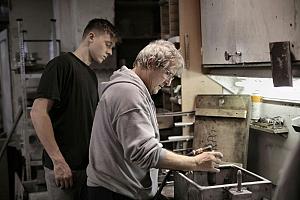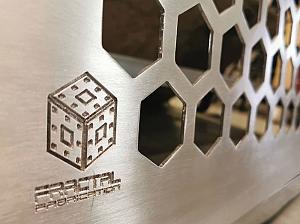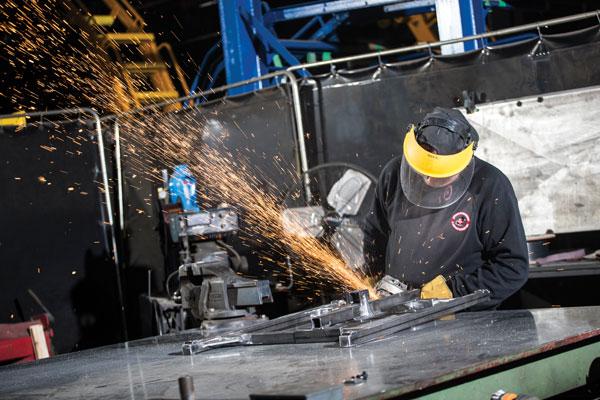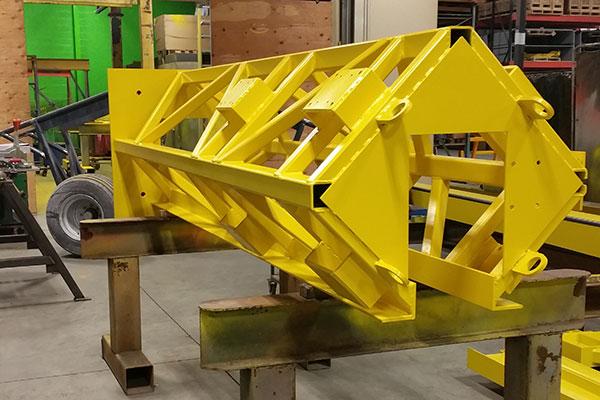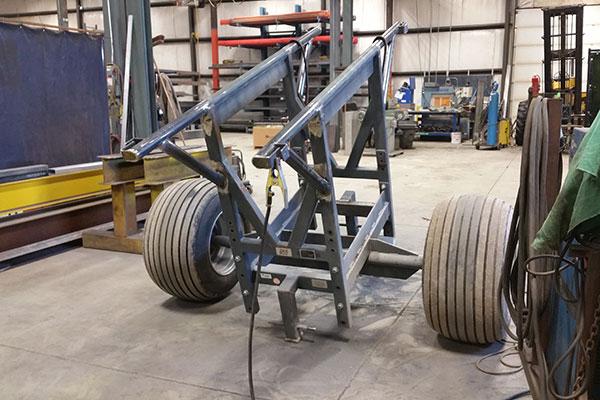- FMA
- The Fabricator
- FABTECH
- Canadian Metalworking
Manufacturing Safety
Liftsafe Group builds products for safe material handling, security
- By Joe Thompson
- April 6, 2015
- Article
- Made In Canada
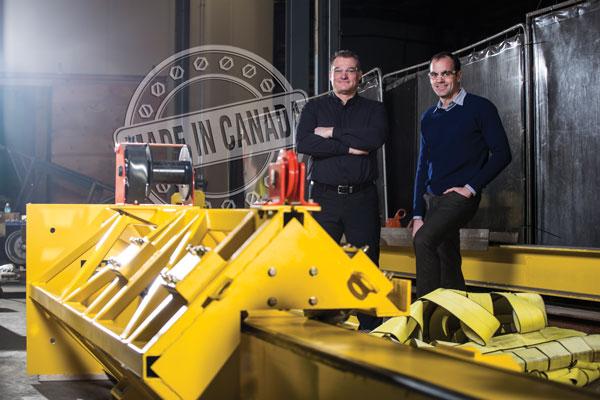
Dirk Kerbs (left), president, and Rob Barrett, vice president—engineering, of Liftsafe Group of Companies, Ayr, Ont., stand by one of the company’s recently fabricated and painted cranes.
As its name implies, the Liftsafe Group of Companies is all about safety.
It is more than a single entity too. The company comprises four different divisions with a single theme in common: safety. The four companies— Liftsafe Engineering, Liftsafe Fall Protection, PARCS, and R&D ERGO—revolve around building, selling, inspecting, and servicing equipment, much of which is built in the company’s two Ayr, Ontario, manufacturing facilities.
The company probably is best known for its line of overhead, jib, and gantry cranes, although a large part of that business also includes the installation, service, and prestart reviews of the equipment.
Inspections are performed on custom lifting fixtures, access ladders, overhead cranes, mobile cranes, and personnel and automotive lifts. The company also has an in-house service department that includes 24-hour emergency service, as well as on-site breakdown service. One of the Ayr facilities also is stocked with common wear parts, and it has a hoist inspection and testing area.
Custom lifting systems make up an important part of Liftsafe Engineering, with numerous electric and pneumatic hoist options, spreader bars, and overhead lifting equipment. Recently this division of the company has been manufacturing equipment for the worldwide aerospace market, including tire carriers, engine access platforms, and aircraft access stands.
This ground support equipment, currently in use by many of the world’s largest airlines, represents a significant growth area for the company. But it is in the crane business where Liftsafe began.
Building Material Handling Systems
“The crane business is where we started,” explained Dirk Kerbs, president of Liftsafe. “It was 1991 when the company started working with cranes, and it’s what industry thinks of first when they think of us. Since then, however, we’ve worked hard to expand and diversify.”
Part of that diversification comes in the form of fall safety products. The company’s Liftsafe Fall Protection division creates, installs, and inspects roof guarding and various netting systems.
“Whether it’s on a roof or inside a facility, we can create a custom system that is tailored to an individual location,” said Kerbs.
Fall Protection Made Simple
Designed as a safe, easy way to provide worker safety around rooftop mechanical equipment, the company’s Roof Guard system keeps workers from being put at risk when they are working up high.
Whether it’s a simple railing or a more custom, engineered installation, this division of the company is all about keeping workers safe while they move around a building.
Playground Equipment Inspection
PARCS provides inspections and maintenance of playground equipment. The PARCS team offers sales, delivery, installation, safety inspections, and maintenance and repair of playground and recreational equipment.
The government requires that all play spaces in Ontario are maintained and inspected to ensure the safety of playing children.
“We can supply these maintenance and inspection services because we have a qualified staff that is on the road,” said Kerbs.
The last of the four divisions, R&D ERGO, creates a number of standard as well as custom ergonomic handling systems. This part of the group supplies equipment to the automotive, manufacturing, pharmaceutical, food and beverage, and warehousing industries.
This division creates systems that keep workers safe from the threat of injuries caused by heavy lifting, repetitive movements, and poor posture. Ergonomic hazards can result in debilitating injuries, reduced productivity, and loss of work time caused by a rehabilitation process. Along with safety concerns, risk management issues are addressed when ergonomic systems are used in the workplace.
“We are a complex company because we serve so many different industries, but at our heart we are about moving material safely and providing protective products and services,” said Kerbs.
“We also place a high value on engineering,” explained Rob Barrett, vice president—engineering. “Customers can buy off-the-shelf solutions from many different vendors, but what we offer is a custom engineered system designed in-house and fabricated in our shop.”
Fabricators Welcome
Liftsafe supplies some standard products, such as cranes with capacities from 1 to 100 tons, but the company welcomes the challenge of creating one-off, specialized equipment.
“We recently did a crane at CFB Trenton that is 135 feet long,” said Barrett. “It wasn’t a typical install either. We had several challenges to overcome besides just the length of the crane itself.”
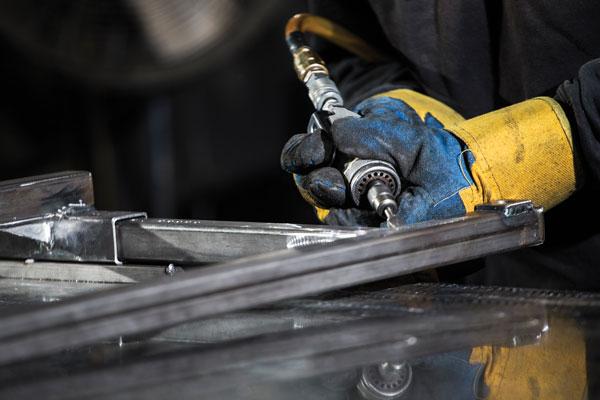
Custom fabricating work is performed at the company’s Ayr, Ont., facility, ensuring fast turnaround time and product quality.
Crane systems must be designed to suit the application’s capacity, its duty class, and required environmental conditions. Liftsafe’s engineers ensure that they select the correct components to meet these criteria.
Crane installation includes a prestart health and safety review exemption letter and all of the proper engineering sign-offs, as required by the Ministry of Labour and local building codes.
Liftsafe is as much an engineering company as it is a manufacturer. It uses software to optimize girder selection, verify code compliance, and ensure deflection is minimized.
The company takes a consultative approach in its engineering application. Not only does Liftsafe have to build devices to safely move material, it keeps the end user in mind through ergonomic design.
“There is a balance that must be struck between safety and productivity, and we meet with our clients often throughout the design process to make sure we are meeting their goals. After the design phase, we have a couple more sign-off dates, and then we start manufacturing their system,” explained Barrett. “We will show them the 3-D renderings our designers produce, and that helps keep everyone on the same page so there are no errors in what we manufacture.”
Working mainly with aluminum and steel—although stainless is used for customers in the food and beverage and pharmaceutical industries— Liftsafe’s fabricators are responsible for a project from beginning to end.
“The guys on the shop floor are more than simply welders,” said Barrett. “They are true fabricators and fitters that are highly skilled at what they do. They fabricate the cranes, material handling devices, spreader bars, and all of the rolling equipment that we make for the aerospace industry.”
It means that each person on the shop floor has a skill set that is both strong and varied.
“Our guys can assess a build and give us feedback on the best way to proceed with it,” said Kerbs. “That’s the type of worker that is starting to disappear from the landscape a little. [Our fabricators] can weld and fabricate parts, but they also have the years of experience that tell them whether they should be doing it the way that it’s laid out for them.”
Skilled Labor Pool
The company has a large install base of its products in the local Kitchener/ Waterloo area and attracts both fabricators and inspectors from that area, although on-the-road inspectors often are based far afield across the province.
“This area is important to us,” said Kerbs. “Not only from a customer base standpoint, but also from the standpoint that most of the staff live in the area too.”
While the future of the company definitely is tied to the manufacture and inspection of cranes—the company’s core business—there is room for growth thanks to a booming aerospace sector.
However, the past hasn’t been too much trouble for the company either. Even during the recession, work at the Liftsafe companies continued at a steady pace.
“We saw the recession happening all around us, but it really didn’t affect us in a major way,” said Kerbs. “The nature of the company kept us from the free fall that hurt so many other companies.”
With so much happening at the company, it can be hard to pinpoint exactly what Liftsafe does. Whenever he is asked, Kerbs has a simple reply: “We are in the safety business.”
subscribe now


Keep up to date with the latest news, events, and technology for all things metal from our pair of monthly magazines written specifically for Canadian manufacturers!
Start Your Free Subscription- Trending Articles
- Industry Events
MME Winnipeg
- April 30, 2024
- Winnipeg, ON Canada
CTMA Economic Uncertainty: Helping You Navigate Windsor Seminar
- April 30, 2024
- Windsor, ON Canada
CTMA Economic Uncertainty: Helping You Navigate Kitchener Seminar
- May 2, 2024
- Kitchener, ON Canada
Automate 2024
- May 6 - 9, 2024
- Chicago, IL
ANCA Open House
- May 7 - 8, 2024
- Wixom, MI





